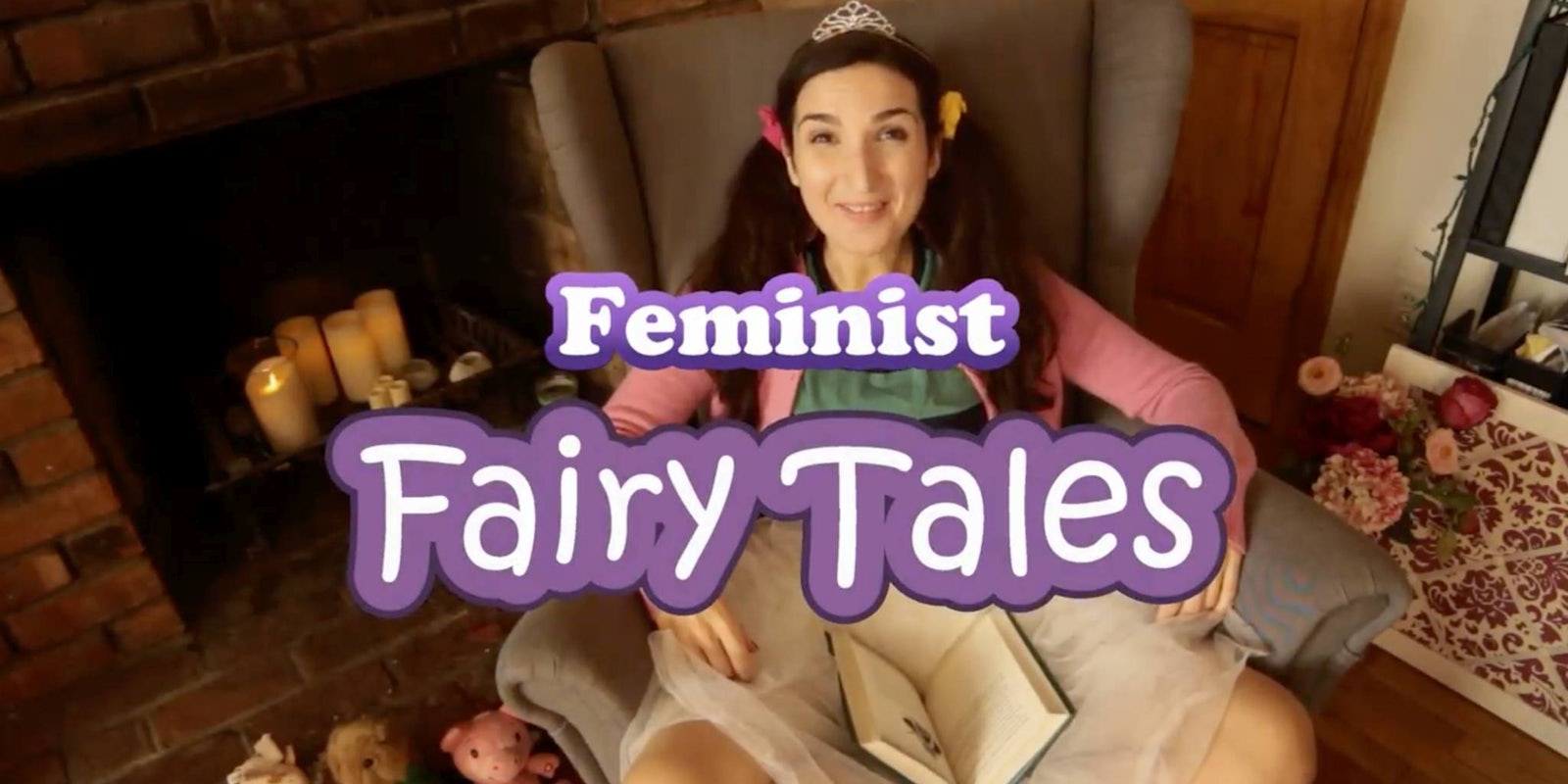Deeply hidden away in every American is a memory of some fairytale they first heard as a child—and those standards of Eurocentric beauty are haunting.
Actor/comedian Sarah Ann Masse is the American half of British-American sketch comedy duo, We Are Thomasse. Her husband and fellow performer Nick Afka Thomas is the Brit. Masse was reminded of her childhood fairytale fascination during a recent audition in Los Angeles after moving from New York earlier this year. Then she was struck with a character idea. She decided to put a feminist twist onto those childhood fairytale memories.
“I’ve always loved Disney and princesses, and the first movie I can remember is The Little Mermaid,” Masse told the Daily Dot. “I think that’s a pretty common experience.”
Masse teamed up with others to work on Feminist Fairytales. Mark Philip Lichtenstein directed the first three episodes—Snow White, Sleeping Beauty, and Cinderella—and Jose Grau and Nick Afka Thomas directed episodes 4-6—The Little Mermaid, Beauty and the Beast, and Rapunzel.
In each Masse plays a sweet, innocent, elf-like girl, who is made smaller by the camera looking down at her from above, while she reads aloud fairytales from a giant book that’s sitting on her lap. She tells the stories enthusiastically, as a true storyteller always does, interjecting the decorated text with blunt moments of female self-awareness and real-life honesty.
For instance, it’s disturbing that, in Beauty and the Beast, Belle actually does marry the Beast because he is not attractive, but she must be. How often it happens that beautiful women end up with hideous, older, wealthy men. Take, for example, some of the men on this list. This reinforces another double standard of heteronormativity: That women have to remain “perfect” and “beautiful” forever, but men can be pretty much, well, beasts.
In the Sleeping Beauty video, the young girl character throws in some gems like: “Because even babies have to be physically attractive if they’re girls, or else they hold no value or interest.” At first read, it seems bizarre that anyone would call a baby beautiful. But upon closer reflection, it turns out that this is utterly and completely the case.
“Even as infants, they’re always described as beautiful [in fairytales]. It’s immediately about the outside and that is it,” says Masse.
Another line from the Sleeping Beauty fairytale makes direct references to rape culture: “He kissed her. Because even though she couldn’t give consent because she was lying there, she was asking for it.”
Statistics show that one out of every six American women has been the victim of attempted or completed rape in her lifetime. In L.A., the comedy community has come under fire, especially after comedian Beth Stelling’s brave decision to post photos of the domestic violence she suffered from a fellow male comedian who she used to date.
Masse herself is a survivor of sexual assault. Re-watching these fairytales as an adult triggered even more awareness for Masse, which led to this decision to remake them as short videos imbued with a type of feminism made sharable for the internet.
“Having these videos come out has been empowering because so often we feel like we don’t have a voice, because we feel fear for our careers,” says Masse. “It felt empowering to me knowing that I was putting out something that could have this backlash.”
Another recurring theme in this series? Notions of marriage in fairytales, especially that of Cinderella. Feminist Fairytales calls out the real situation that this woman was in: “Stay at home and be emotionally abused or go with the misogynistic prince who only saw her as a prize. She decided to go with the prince and his money because society says that women are only important if they are married.”
Masse is married, but her marriage is obviously—and thankfully—nothing like that of the depressing misogynistic fairytales. She lives and works with her better half and creative dreamboat Nick Thomas. He was involved in the videos as well, mostly helping to tighten scripts by cutting lines or adding jokes.
“The genius of this is Sarah,” he says. “I am merely an extra set of eyes.”
Even though all six of these fairytales are disturbing in their original forms, Masse is pleased to see that over time the stories have gotten better. Nowadays, we’ve come far enough along that women aren’t always the “damsels in distress” and men are the heroes. But there is still plenty of cultural appropriation and ethnic misrepresentations that the entertainment industry is finally starting to address.
“We live in a patriarchal society and our entertainment reflects our community and mindset,” says Masse. “We are always surprised at how much sexist, racist, ableist, and homophobic material is out there. We want to contribute to less of that being in the comedy world.”
The Feminist Fairytales are available to stream on YouTube and FunnyOrDie.


